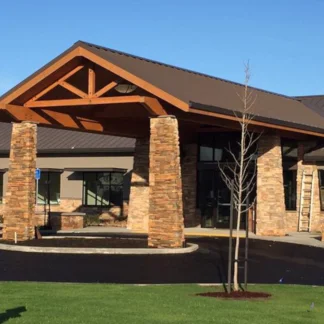Willamette Family Treatment Services - Women's Residential
Willamette Family Treatment Services Women’s Residential is a co-occurring subst...
Serenity Lane is an accredited drug and alcohol addiction treatment center in Eugene, Oregon for adults. The center offers a full continuum of care for individuals struggling with addiction, providing a range of tailored services for comprehensive treatment.
At Serenity Lane, this averages somewhere between 30 and 60 days. However, this may vary based on individual treatment needs and financial resources.
Serenity Lane provides a medically supported withdrawal program, more commonly known as detox, designed to aid individuals in safely navigating the withdrawal phase from substances. The center incorporates medication assisted treatment (MAT) during this critical first step in the recovery journey, as needed.
Serenity Lane’s residential drug rehab program offers a structured, immersive environment for recovery. With a team of seasoned professionals providing 24/7 care, individuals are guided through a personalized treatment plan that addresses their specific addiction and any co-occurring disorders.
Serenity Lane’s partial hospitalization program (PHP) allows clients to experience the benefits of a highly structured treatment environment while still being able to return home each evening. At a minimum, the programming duration will be 20 hours per week. Through personalized treatment plans, clients receive various medical and therapeutic services.
The outpatient treatment program at Serenity Lane is designed for individuals who require flexibility during their recovery journey. Offering the same rigorous treatment as residential programs, but with the convenience of living at home.
Serenity Lane emphasizes the importance of aftercare, offering continued support after initial treatment. The aftercare program provides clients with a platform for ongoing recovery, encouraging the maintenance of sobriety in the long term.
Contact us for more information: (541) 687-1110

Connect with Serenity Lane - Coburg Industrial Way by calling their admissions team directly.
(541) 687-1110 Website Get DirectionsThe Commission on Accreditation of Rehabilitation Facilities (CARF) is a non-profit organization that specifically accredits rehab organizations. Founded in 1966, CARF's, mission is to help service providers like rehab facilities maintain high standards of care.
CARF Accreditation: Yes Accreditation Number: 266177
The Substance Abuse and Mental Health Services Administration (SAMHSA) is a branch of the U.S. Department of Health and Human Services. Established in 1992 by congress, SAMHSA's mission is to reduce the impact of substance abuse and mental illness on American's communities.
SAMHSA Listed: Yes
Serenity Lane's nationally recognized Family Program is an educational program that focuses on repairing relationships damaged by years of destructive chemical dependency. Their program is designed to integrate the patient and the family and to supply vital information about how this disease negatively impacts the family system. The Family Program is offered in a 4-weekend series. Attending all the sessions is highly recommended. This program is an integral part of Serenity Lane's Residential Treatment.
Each counselor has a number of patients, who together, form a group. On weekdays, the group will meet each morning and afternoon to explore problems, feelings, changes and conflicts that come up in the treatment process. This is called group therapy and it is a significant part of residential treatment. Patients will be oriented to group and assigned a "buddy" (another patient who is further along in treatment). This person will help explain the rules and ease transition into the group environment.
In individual therapy, a patient meets one-on-one with a trained psychologist or counselor. Therapy is a pivotal part of effective substance abuse treatment, as it often covers root causes of addiction, including challenges faced by the patient in their social, family, and work/school life.
Nicotine Replacement Therapy (NRT) is a way of getting nicotine into the bloodstream without smoking. It uses products that supply low doses of nicotine to help people stop smoking. The goal of therapy is to cut down on cravings for nicotine and ease the symptoms of nicotine withdrawal.
Each counselor has a number of patients, who together, form a group. On weekdays, the group will meet each morning and afternoon to explore problems, feelings, changes and conflicts that come up in the treatment process. This is called group therapy and it is a significant part of residential treatment. Patients will be oriented to group and assigned a "buddy" (another patient who is further along in treatment). This person will help explain the rules and ease transition into the group environment.
In individual therapy, a patient meets one-on-one with a trained psychologist or counselor. Therapy is a pivotal part of effective substance abuse treatment, as it often covers root causes of addiction, including challenges faced by the patient in their social, family, and work/school life.
Nicotine Replacement Therapy (NRT) is a way of getting nicotine into the bloodstream without smoking. It uses products that supply low doses of nicotine to help people stop smoking. The goal of therapy is to cut down on cravings for nicotine and ease the symptoms of nicotine withdrawal.
In individual therapy, a patient meets one-on-one with a trained psychologist or counselor. Therapy is a pivotal part of effective substance abuse treatment, as it often covers root causes of addiction, including challenges faced by the patient in their social, family, and work/school life.
Nicotine Replacement Therapy (NRT) is a way of getting nicotine into the bloodstream without smoking. It uses products that supply low doses of nicotine to help people stop smoking. The goal of therapy is to cut down on cravings for nicotine and ease the symptoms of nicotine withdrawal.
Nicotine Replacement Therapy (NRT) is a way of getting nicotine into the bloodstream without smoking. It uses products that supply low doses of nicotine to help people stop smoking. The goal of therapy is to cut down on cravings for nicotine and ease the symptoms of nicotine withdrawal.
Willamette Family Treatment Services Women’s Residential is a co-occurring subst...
Lane County Behavioral Health is a public rehab located in Eugene, Oregon. Lane ...
Emergence is a non-profit rehab located in Eugene, Oregon. Emergence specializes...
Roseburg VA Health Care System - Eugene Health Care Center is a public organizat...